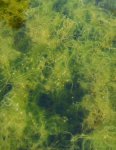Zayde said:
1. Can anyone identify anything special from this photo ?
2. My local pond specialist thought that algae-killing chemicals would be best in warmer weather. Could the fish be harmed by waiting for a few weeks ?
1. Sorry, I don't know what algae it would be.
2. I wouldn't trust the product's marketing. It's really "consumer beware" when using those algae-killing chemicals and be sure you follow the instructions to the letter, which includes making sure you know exactly how many gallons are in your pond. If ya have to guess the number of gallons, then low ball the estimate. These chemicals are essentially basic oxidizers with extra additives that make it stronger while supposedly "safer" for your fish. So, read the labels on the algae-killing chemicals, pay very close attention to the warning labels, and do your due diligence as a consumer to research the product reviews. I always use hydrogen peroxide (3% grade from the gocery store), but this stuff can be just as dangerous except you know exactly what is in it instead of all the extra additives that you might not know in the "pond store" algae kill chemicals. Do you know
exactly how many gallons is in your pond ??
Yes, the fish could be significantly stressed with a high algae load, depending on your water KH levels. Do you test your KH (alkalinity) water parameter ??
I would right away get a toilet brush and do your best to "spaghetti noodle" it out of the water. Personally, due to the fish's disabled state in cold water, I would not feel comfortable dosing an oxidizer in the pond during cold water temperatures. Due to removing the algae, your ammonia and nitrite levels could increase since the algae has been consuming the ammonia. What do you use for a bio-filter ?? What's the age of your pond ??
Few more thoughts... My apologies for going to become a bit technical...
It is basically a myth that cold water temperatures will cure your algae problems. I have seen a few ponds, which are quite clean of debris, still have significant algae growth even when the water averages 40*F. Since your good bacteria are slowed down in cold water temperatures, then this helps the algae continue to grow due to an accumulationg of ammonia and carbon dioxide. Although the fish's metabolism is slowed down significantly in cold water, they are still noticeably active enough to eat algae and to eat other types of cold water foods. I know of a couple of koi breeders that continue to feed their fish in 45*F water, even though the food regiment is decreased; then, they often during this time will force their fish to start fasting for a minimum of 6 weeks to 2 months. Depending on how efficient your bio-filter is built, the good bacteria will still convert the ammonia from the food regiment, even though at a slower rate due to the cold water.
Fish continue to release ammonia (NH3) through their gills and carbon dioxide (CO2) through their skin. Then, only
some of this NH3 is dissolved into water to become NH4, depending on your pH and water temperature. "Total ammonia" is referring to both your NH3 and NH4 ammonia. Total ammonia and CO2 are two of the main ingredients algae need although not required for growth; phosphate is not always required for the algae to grow depending on the species. If there is not enough CO2, then algae can break down bicarbonate (HCO3-) to be converted into CO2 and water (H2O), which this takes a Hydrogen ion (H+) away from your water potentially creating a pH swing. If your KH levels are low and with a pond full of algae, then the algae consuming the dissolved inorganic carbones, that is CO2 and HCO3-, through photosynthesis and then releasing CO2 through respiration cause major diurnal pH swings. When your pH is high in the afternoon/evening and low in the mornings, this is what is called a diurnal pH swing. Since the fish's immune system is already almost non-existent in 40*F cold water, then these major pH swings will cause your fish to become stressed even more.
Algae respires whenever there is a lack of sunlight, which is the opposite of photosynthesis. Since the winter day's are shorter, then the algae's respiration period is much longer than its photosynthesis period. As the algae is respiring, then the plant is significantly consuming the oxygen out of the water and releasing more CO2 into the water. Due to CO2 being the denominator in the pH equation, the addition of CO2 bypasses your carbonate buffer creating a major diurnal pH swing. However, this also means the higher your KH then the less impact CO2 will effect the pH even though the CO2 never consumes KH.
In conclusion, yes, algae does continue to grow in your ponds in cold waters, and yes, the algae can potentially be harmful to your fish by waiting for a few weeks if your KH is low.





